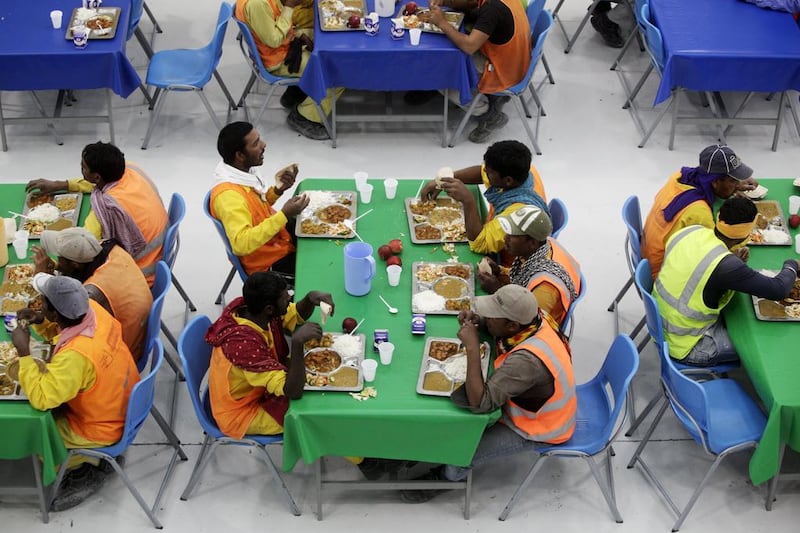The National toured the accommodation with TDIC officials and operators and was given the opportunity to speak to residents.
Most said they were not happy with the food served in the communal dining hall, with some complaints centring on the quality of the bread served.
Pakistani Shareef Zaman, a carpenter, said: “Bread is not cooked properly. I don’t ask for high-quality bread. But I want the same bread cooked properly.
“We love mostly eating roti in our main course, but if the bread is not cooked well, it causes indigestion. Still they serve machine-cooked bread.”
However, he was happy with the chicken curry on offer in the mess hall that day.
The village is home to about 7,000 labourers, and has a capacity of 20,000.
“We don’t have the facility for preparing bread here. It comes from Mussaffah,” said Georges El Ghoul, the site’s catering manager.
“For lunch, bread comes at 10.30am and dinner 4.30pm, as we start dinner at 6.30pm.
“Workers from India, Pakistan and Bangladesh all have different tastes, so we have separate food for them to suit their tastes, but still there are some people who complain.
“If you ask, somebody would the say food is nice and somebody else would tell you it’s not tasty. We serve 8,000 people. I can’t make mother-cooked, home-tasting food.”
Raj Kumar, from the northern Indian state of Punjab, said: “Everything is good except the food. We don’t have any problem at the camp.”
Shashindra Sisi, from Kerala, was also unhappy with the quantity and taste of the food on offer.
However, there were some workers who enjoyed it.
“On average the food is good here,” said Bangladeshi Rabiul, a scaffolder. “Workers here are from different regions and countries have different tastes; always there are some people who would complain.”
When The National visited, lunch was mixed vegetables, lentils, chicken-sausage curry, khubuz/bread, salad, an apple and a Laban-up drink.
Jaanzeb Khan, a labourer from Pakistan who was having his lunch at the mess, has lived at the village for a year.
He said: “We have vast lush green ground and centrally air-conditioned accommodation equipped with all facilities, but why is the food quality not upgraded?”
Hisham Sidani, operations manager at Hirmas Real Estate, the company responsible for managing the accommodation, said: “We have a team here who meet regularly with workers who complain about the food.”
He said when residents were asked what was wrong with the food they said they “don’t like the spices, it’s too hot, or too mild”.
“We started trying to adjust it slowly for them,” Mr Sidani said. “We have different menus for each nationality.”
_____________________________________________________________
More coverage on this topic:
■ TDIC improves lives of Saadiyat workers
■ UAE has ratified nine international labour conventions
■ Passport retention by UAE companies less common
■ A tour of the Saadiyat Accommodation Village - in pictures
_____________________________________________________________
About this package:
The UAE has signed up to nine International Labour Organisation conventions to protect workers’ rights, and in 2006 was the first country in the region to enact a comprehensive anti-human trafficking law. These conventions spurred the Tourism Development & Investment Company (TDIC) to improve the quality of life for 7,000 employees living in workers villages on Saadiyat island. While most workers say they are satisfied with life in Saadiyat Accommodation Village, many have voiced concern about the poor taste of the food. Despite criticism, the purchasing power of the dirham in Southest Asian countries remains a major factor in attracting expatriates to the UAE. Similarly, concerns over passport retention have decreased as the practice has become less common in the UAE.
anwar@thenational.ae






